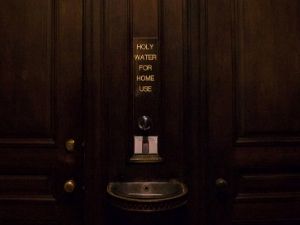
I’ve seen a lot of pictures lately of priests standing in front of homes blessing the members of the household as they gather on the front porch or steps. I think that’s great! But we don’t have to wait for the pastor to come by to celebrate blessings.
Blessings come in many, many forms. A blessing has two purposes: to make us holy and to glorify God. All blessings are a form of God’s word. Blessings “say” that Christ is risen and all creation (especially the person or thing getting blessed) is a sign of new life in Christ.
It is especially important to know that blessings are sacramental (small “s”). In this time when we are isolated from celebrating the official Sacraments, celebrating sacramental blessings can be a great comfort. A blessing is always a promise from God to help us in our need. Through blessings, God reassures of us of God’s faithfulness to the promise to be with us always.
When you can give or ask for a blessing
Mostly, it is people who get blessed. But we also invoke blessings on objects and places that people use or inhabit. Even when we bless objects or places, however, the focus of the blessing is on sanctifying the people who use those things and on glorifying God.
For example, Christians are in the commendable habit of praying a blessing over a meal before we eat. But it is not the meal that is the main focus of the blessing. The focus is on God and God’s people. Pope Francis says:
That moment of blessing, however brief, reminds us of our dependence on God for life; it strengthens our feeling of gratitude for the gifts of creation; it acknowledges those who by their labors provide us with these goods; and it reaffirms our solidarity with those in greatest need. (On Care for Our Common Home, 227)
To be a “blesser” is to imitate God, the ultimate Blesser. The church teaches, “The ministry of blessing involves a particular exercise of the priesthood of Christ…” (Book of Blessings, General Introduction, 18). Each member of the priesthood of Christ — bishops, priests, deacons, and members of the faithful —have a ministry of blessing suited to their role in the Body of Christ.
In this time when we are isolated from celebrating the official Sacraments, celebrating sacramental blessings can be a great comfort. Through blessings, God reassures of us of God’s faithfulness to the promise to be with us always.
Blessings in the domestic church
Within Christian households, parents should bless children, spouses should bless each other, housemates should bless their objects of veneration, and all should participate in the liturgical prayer of the domestic church.
For a longer explanation of how to use blessings in our homes, see this article, “Blessings for the Domestic Church,” by Diana Macalintal. In that article, she says:
Every Christian can bless, and it is in the home where Christian families “exercise the priesthood of the baptized in a privileged way” (Catechism of the Catholic Church, 1657). Through its own liturgical year, the domestic church gathers at special moments and at ordinary times as the familiar rhythm of prayer orders its days.
The Rite of Christian Initiation of Adults also includes an entire series of blessings for catechumens. In this time when initiation has been delayed for so many of our elect, we should be using the RCIA blessings to strengthen and encourage them as they await their full initiation into the Body of Christ. The rite says:
The blessings of the catechumens are a sign of God’s love and of the Church’s tender care. They are bestowed on the catechumens so that, even though they do not as of yet have the grace of the sacraments, they may still receive from the Church courage, joy, and peace as they proceed along the difficult journey they have begun. (95)
For a deeper look at how to bless catechumens, see this article that I wrote earlier, “15 occasions to bless an RCIA catechumen.”
Blessing the catechumens and candidates
And our friend, Michael Marchal, has written a blessing his community is using with the catechumens and candidates who gather via video conferencing to watch Sunday Mass. This is an excellent way to remind the rest of the parish that we still have seekers waiting for initiation or reception into full communion. And it can be source of strength and comfort for the seekers and their loved ones. To download a copy of the blessing, click on the button below.
Our entire life is a blessing, even in these difficult times. By making use of the church’s rich treasury of blessings, we can continue to pray, grow, and witness as a sacramental people.
Your turn
How do you promote the sharing of blessings through your RCIA ministry? How do you practice it yourself in your own home, or with your friends? Share your thoughts in the comments below.









Helpful and informative. I appreciated reading and learning about blessings. This presentation is a great evangelizing instrument.